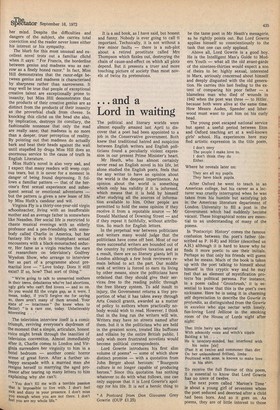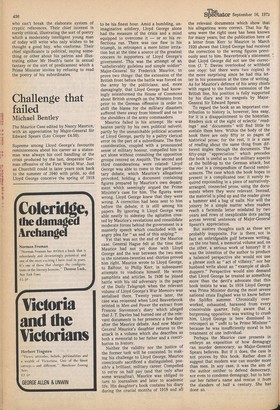. . . and a Lord in waiting
The political and literary worlds were almost equally amazed last April to discover that a poet had been appointed to a job in the Conservative government. Both knew that traditional hatred and suspicion between English writers and English politicians found a peculiarly violent expression in our present Prime Minister's heart.
Mr Heath, who has almost certainly never read an English novel in his life, let alone studied the English poets, feels that for any writer to have an opinion about the world is the deepest impertinence. An opinion about the world is something which only has validity if it is informed, which means that it is held by himself after studying all the sources of information available to him. Other people are permitted to hold the same opinion if they receive it from a reputable source — Mr Donald Maitland of Downing Street — and if they repeat it faithfully, without attribution. So much for English letters.
In the perpetual war between politicians and writers many would judge that the politicians have come off best. Most of our more successful writers are hounded out of the country by retributive taxation and as a result, there are no literary giants left in London although a few book reviewers remain behind to act the part. Our middle rank of writers is forced to earn its living by other means, since the politicians have ordained that they should give their services free to the reading public through the free library system. To add insult to injury, the Government returns a tiny proportion of what it has taken away through Arts Council grants, awarded as a matter of policy to authors whom practically nobody would wish to read. However, I think that in the long run the writers will win. Writers may have no streets named after them, but it is the politicians who are held in the greatest scorn, treated like buffoons and villains by the entire British public. I only wish more frustrated novelists would become political correspondents.
Lord Gowrie introduces his first slim volume of poems* — some of which show distinct promise — with a quotation from John Berger about heroism: "Bourgeois culture is no longer capable of producing heroes." Since this quotation has nothing whatever to do with what follows, one can only suppose that it is Lord Gowrie's apology for his life. It is not a heroic thing to * A Postcard from Don Giovanni Grey Gowrie (OUP E1.25) be the tame poet in Mr Heath's menagerie, as he rightly points out. But Lord Gowrie applies himself so conscientiously to the task that one can only applaud.
Above all, Lord Gowrie is a good boy. He is the Intelligent Man's Guide to Modern Youth — what all the old avant-garde of the nineteen-thirties would expect a son of theirs to be: highly sexual, interested in Marx, seriously concerned about himself and deeply disgusted with the old generation. He carries this last feeling to the extent of comparing his poor father — a blameless man who died of wounds in 1942 when the poet was three — to Hitler, because both were alive at the same time. How Messrs Auden, Spender and Isherwood must want to pat him on his curly head.
The young poet escaped national service but spent a useful period between Eton and Oxford teaching art at a well-known girls' school. His experiences here may find artistic expression in the title poem,
I don't envy The people I make love to. I don't think they do Either.
Where he reveals later on:
They are all my pupils. They have black pupils.
After Oxford he went to teach in an American college, but his career as a lecturer was cruelly interrupted when he was taken from his humble but satisfying job in the American literature department of London University to fill a post in the Government which had suddenly become vacant. These biographical notes are essential to an understanding of many of the poems.
In 'Postscript: History' comes the famous confusion between the poet's father (described as P. H-R) and Hitler (described as A.H.) although it is hard to know why he finds it more poetic to use their initials. Perhaps so that only his friends will guess what he means. Much of the book is taken up with the poet talking to himself about himself in this cryptic way and he may feel that an element of mystification protects 'his political persona. For instance, in a poem called ' Groinbrush,' it is essential to know that this is the poet's own nickname. Here he is using it in charming self depreciation to describe the Gowrie in profundis, as distinguished from the Gowrie in excelsis who sips nectar with lonely, fun-loving Lord Jellicoe in the smoking room of the House of Lords night after night:
That little hairy ape, satyrical With adenoidy voice and witch's nipple Balding a bit . . .
He is lavatory-minded, has interfered with his neice [sic] • (Past it at twelve and commoner than dirt On her unlaundered frillies), limbs Poulticed with acne, is known, to make love in his shirt.
To receive the full flavour of this poem, it is essential to know that Lord Gowrie has no niece of twelve. .
The next poem called 'Marion's Time' is about a young girl of seventeen whom the poet seduced and deserted after a child had been born. And so it goes on. As poems, they are of little interest to those who can't break the elaborate system of cryptic references. Their chief interest is surely critical, illustrating the sort of poetry which a moderately intelligent young man of today will write who only wishes to be thought a good boy, who conforms. Their chief significance is political, saying something or other about his patron and illustrating either Mr Heath's taste in sexual fantasy or the sort of predicament which a Prime Minister invites by refusing to read the poetry of his subordinates.



































 Previous page
Previous page